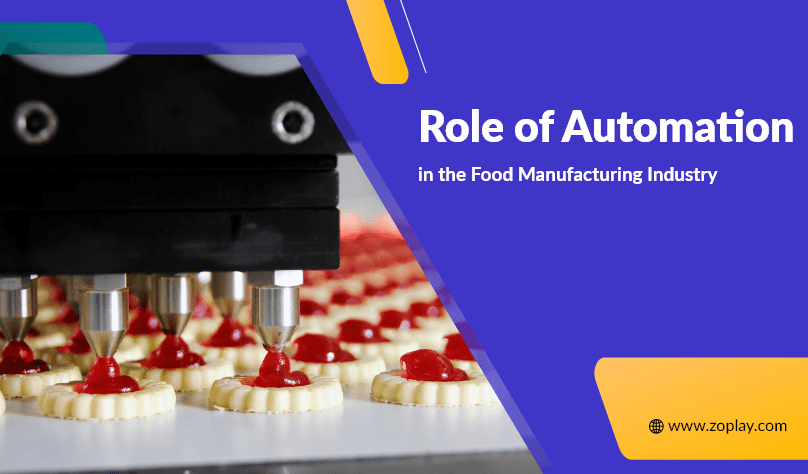Role of Automation in the Food Manufacturing Industry
Role of Automation in Food Manufacturing Industry
Automation is the most sought-after technology trend in recent times. By leveraging it, industries belonging to various domains are operating at a much higher efficiency. Automation technology is rapidly transforming numerous economic sectors. The food manufacturing industry is no exception.
The food manufacturing industry consists of a diverse range of operations. Depending on the type of business – be it a confectionery, fish processing plant, sugar processing plant, or any other – the complexity of the operations vary. Whatever the complexity may be, effective manufacturing process management results in high-quality food products.
Manually overseeing manufacturing procedures can stifle food manufacturing operations. It can cause slowdowns and errors. That is what automation tackles. Let us take a look at what role automation is playing in the food manufacturing industry.
Tracks raw materials in real-time
Food ingredients and raw materials are essential commodities in the food manufacturing industry. When businesses place orders for them through food delivery apps, tracing their location and delivery status is of paramount importance. Discrepancies in the supply of these items falter business processes. And it is cumbersome to track them manually.
With automation, food manufacturing establishments can view the location of foods and other raw materials in real-time. Using tracking devices like GPS, businesses can manage their supply chain better and mitigate inefficiencies. Automation also helps detect potential issues even before they occur.
Manages inventory
Each type of food manufacturing business has a unique inventory. For example, the item list of a confectionery business may differ from that of a soft drink business. A primary objective that all food manufacturing establishments share is to have a well-maintained and stocked up inventory.
Automation technology aids in making sure there are sufficient inventory items in food manufacturing businesses. By using this technology, organizations no longer need to manually inspect their inventories to gauge what is available and what is not. Software systems automatically keep track of them. Moreover, they can also autonomously place purchase orders of items that are fast depleting.
Standardizes food quality
Food items are fragile. Under the slightest variations in conditions, they spoil. If those items reach end consumers, it becomes a health concern. It can attract non-compliance repercussions.
There are many phases in the manufacturing process. Preparation, packaging, and distribution are a few of them. Each of these food manufacturing stages requires effective quality control.
Image scanning cameras and temperature sensors are some technologies that automate food quality control and grading. Such devices autonomously inspect various parameters of food at different stages of the manufacturing process. It allows businesses to focus on improving other areas.
Mitigates occupational hazards
Although technology cannot completely replace the skill of human labor, it can mitigate potential hazards in the manufacturing process. Besides being capable of ensuring high-quality food, it also minimizes the chance of workplace-related injuries.
Handling scalding hot vessels, continuous chopping of ingredients, and other such activities are highly prone to accidents. On the other hand, with automated technology, food manufacturing plants can make use of conveyor belts and automatic slicers. They improve safety at work to a great extent.
Eliminates errors
Personnel at food manufacturing plants undergo intensive training. Despite that, the possibility of human errors remains at large. No matter the size of the error, it can jeopardize the quality of food and the processes in the supply chain. Human errors are a leading cause of wastage of food and changes in the food output.
Automation technology eliminates food manufacturing errors. It protects end consumers as well as the manufacturing businesses. Whether it’s labeling food packages, ensuring the correct grade quality of food, and more, automation makes sure that they meet the standards and are 100% accurate.
Enhances output
Small food manufacturing businesses can get away with manual operations for only a certain amount of time. Once they scale up, meeting new customer demands on time can be challenging. During that time, the speed at which businesses operate becomes immensely crucial.
Automation helps speed up operations and increase output while curbing costs. This technology allows food manufacturing plants to do more without the requirement of efforts from personnel. It further enhances the safety of food as there will be less human contact with the ingredients.
Provides insights
The need for improving operations in the food manufacturing industry is perpetual. With continuous improvement, businesses can stay on par with the latest trends and requirements of the market. Knowing what aspects of operations are lacking and need enhancement unveils valuable insights. Using them, food manufacturing plants can optimize their operations for better returns on investments.
Automation makes use of Artificial Intelligence and Machine Learning. They both combined capture crucial key performance metrics at various points of the food manufacturing process. Then, these technologies consolidate and process that information into meaningful reports and analytics. All of this happens autonomously. And the output is entirely accurate.
Wrapping up
There are many challenges that plague the food manufacturing industry. One effective solution that resolves all of them is automation. It cuts down costs, boosts operational speeds, eliminates errors, and elevates returns on investments. Without automation, food manufacturing businesses can lack behind their competitors.









